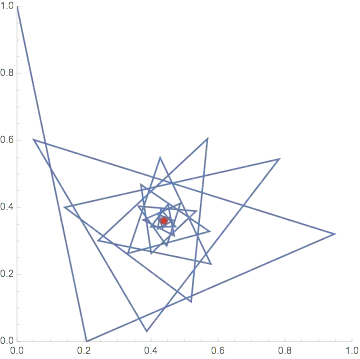How to find $$i^{i^{i^\ldots}} \quad :\quad i=\sqrt{-1}$$ I'm able to find the solution for the finite powers using $$i=e^{i(2k\pi+\frac{\pi}{2})}\quad:\quad k\in\mathbb{Z}$$ $$i^{i}=e^{-(2k\pi+\frac{\pi}{2})}$$ $$i^{i^{i}}=e^{-i(2\pi k+\frac{\pi}{2})}=-i$$ $$i^{i^{i^i}}=e^{(2\pi k+\frac{\pi}{2}) }$$ $$\text{and so on}$$ but what should be the approach to solve for infitie powers$\space$?
Asked
Active
Viewed 210 times
2
Simply Beautiful Art
- 74,685
Arpit Yadav
- 470
- 3
- 16
-
2Note that one should define exponentiation to be single-valued by choosing a branch, which would make this question clearer... – Simply Beautiful Art Aug 12 '18 at 03:03
-
2Your method of computing the iterates is not correct. Note that $(i^i)^i \ne i^{(i^i)}$. – shalop Aug 12 '18 at 03:18
-
@Shalop What should be the correct method of computing the iterates? – Arpit Yadav Aug 12 '18 at 03:21
-
1Going by your rules, we say $i^z = e^{\big(2k+\frac12\big)i\pi z}$. Let us call this function $f(z)$. Now compute $f(i)$. Then compute $f(f(i))$. Then compute $f(f(f(i)))$. You will see that it is not the same as what you are doing. – shalop Aug 12 '18 at 03:44
-
1See also: What is the order when doing $x^{y^z}$ and why?. – Simply Beautiful Art Aug 12 '18 at 04:04
1 Answers
4
$X = i^{i^{i^{\cdot}}}$
So $X = i^X$.
So $\log (X) = X \log (i)$.
So ${\log (X) \over X} = \log (i)$.
So $X = i W(-i)$, where $W$ is the Lambert $W$ or PolyLog function.
Mathematica evaluates this to $X = 0.44 + 0.36 i$.
Here's a graph on the imaginary plane of 200 successive exponentiations with the solution as a red dot:
David G. Stork
- 29,774
-
5
-
5@parsiad. Fair enough. Good thing the OP didn't ask for a proof of convergence! – David G. Stork Aug 12 '18 at 01:19
-
1
-
